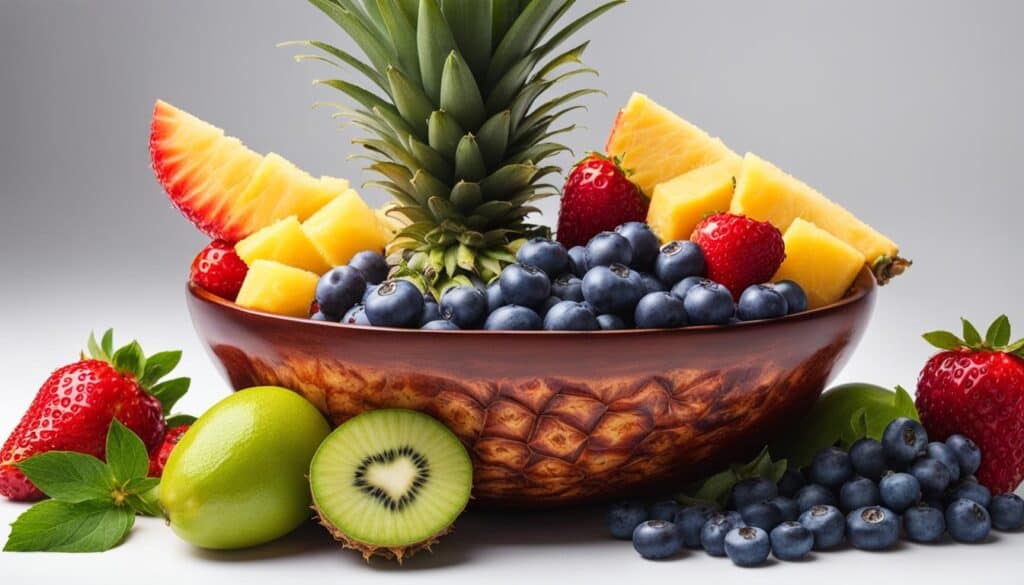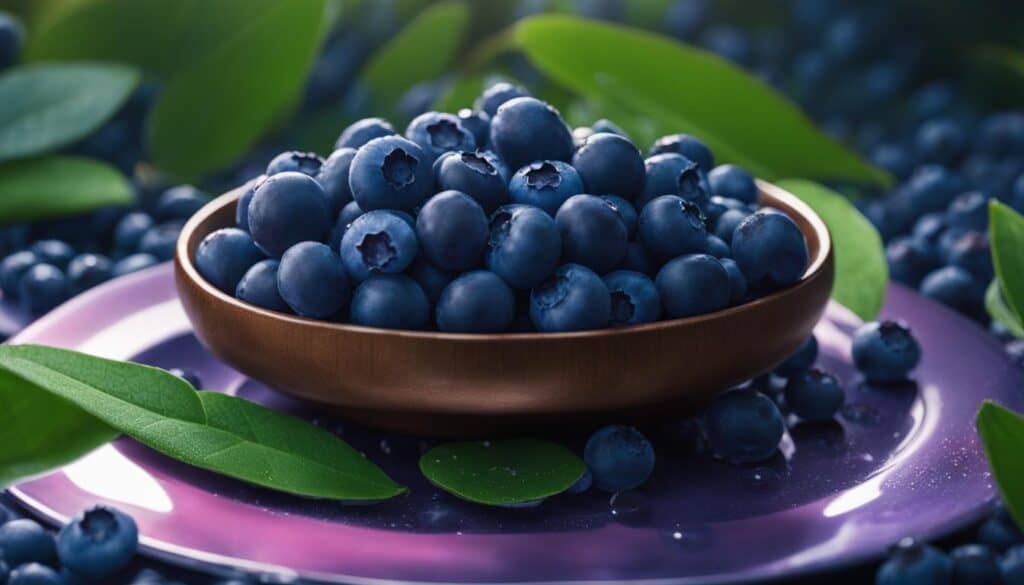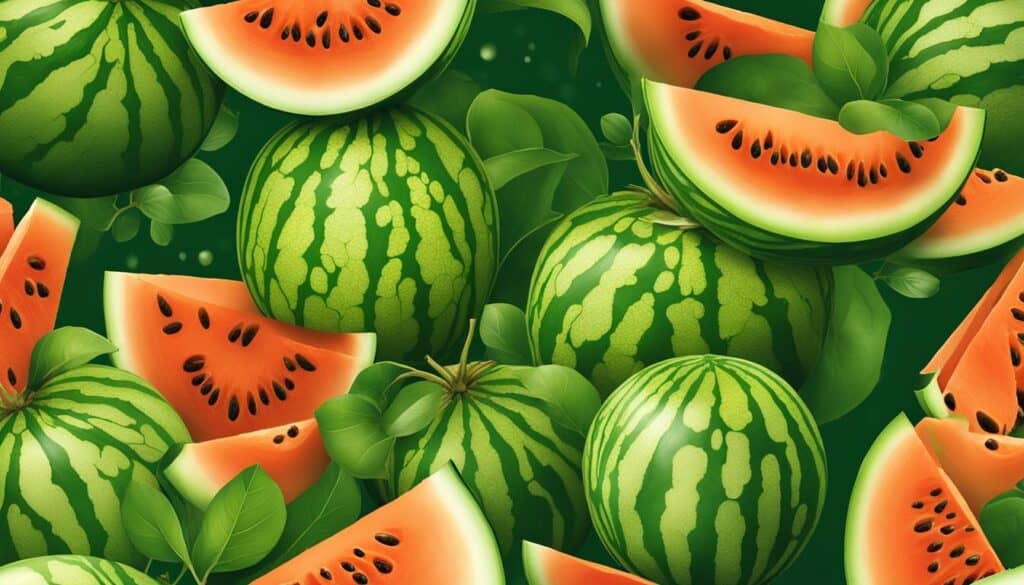A healthy diet plays a crucial role in maintaining optimal kidney function and preventing chronic kidney disease. Incorporating kidney-friendly fruits into your diet can provide essential nutrients, antioxidants, and diuretic properties that can help lower creatinine levels naturally. In this article, we will explore the power of fruits in promoting kidney health and highlight the top fruits to include in your kidney-friendly diet.
Key Takeaways:
- Choosing the right fruits can support kidney health and help reduce creatinine levels.
- Fruits are packed with essential nutrients, antioxidants, and diuretic properties that aid in kidney function.
- Cranberries, red grapes, blueberries, raspberries, melons, oranges, strawberries, apples, pineapples, and cherries are some of the best fruits for kidney health.
- Incorporating kidney-friendly fruits into a balanced diet can improve renal function and protect against kidney diseases.
- Consulting with a healthcare professional is recommended for personalized advice and guidance.
What Are Creatinine Levels?
Creatinine is a byproduct of creatine, produced during muscle metabolism. It is primarily excreted through the kidneys. Elevated levels of creatinine in the blood can indicate impaired kidney function. The normal level of creatinine varies between 60-110μmol/L or 0.7-1.2mg/dL for adult males and 45-90μmol/L or 0.5-1.0mg/dL for adult females.
Normal Level of Creatinine
In order to understand the significance of creatinine levels, it is important to know what the normal range is. For adult males, the normal level of creatinine is between 60-110μmol/L or 0.7-1.2mg/dL. For adult females, the normal level is between 45-90μmol/L or 0.5-1.0mg/dL. These ranges may vary slightly depending on the laboratory and testing methods used. It is essential to consult with a healthcare professional to interpret your specific creatinine levels in the context of your overall health.
Elevated levels of creatinine in the blood can indicate impaired kidney function. The kidneys play a crucial role in filtering waste products from the blood, including creatinine. When the kidneys are not functioning properly, creatinine levels can build up in the blood, leading to elevated levels. Monitoring creatinine levels is an important aspect of assessing kidney health and function.
Measuring creatinine levels through a blood test is a common practice to evaluate kidney function and overall health. If creatinine levels are consistently above the normal range, further investigations may be necessary to determine the underlying cause and develop an appropriate treatment plan.
Why Are Creatinine Levels Important?
Creatinine levels serve as a valuable indicator of kidney function. Since creatinine is primarily excreted through the kidneys, elevated levels can suggest impaired kidney function. Monitoring creatinine levels can help healthcare professionals assess kidney health, identify potential kidney diseases or conditions, and determine the effectiveness of treatment plans for kidney-related issues.
| Creatinine Level | Kidney Function |
|---|---|
| Normal Range | Healthy kidney function |
| Slightly Elevated | Mildly impaired kidney function |
| Moderately Elevated | Moderate kidney dysfunction |
| Significantly Elevated | Severe kidney impairment |
It is important to note that creatinine levels alone may not provide a complete picture of kidney health. Additional tests, such as urine tests and imaging studies, may be required to assess kidney function comprehensively. Consulting with a healthcare professional is crucial for accurate interpretation and appropriate management of creatinine levels.
The Power of Fruits in Lowering Creatinine Levels
Incorporating fruits into your diet can be a game-changer for maintaining optimal kidney health. Fruits are not only delicious and refreshing, but they are also packed with essential nutrients, antioxidants, and diuretic properties that can aid in reducing creatinine levels naturally. By consuming a variety of kidney-friendly fruits, you can support renal function, protect against oxidative damage, and promote overall kidney health.
Fruits offer numerous benefits that contribute to lower creatinine levels and improved renal function. Antioxidants found in fruits help neutralize harmful free radicals and reduce inflammation, which can contribute to kidney damage. Additionally, diuretic properties in certain fruits promote increased urine production, aiding in the elimination of waste substances such as creatinine.
Furthermore, the high fiber content of fruits supports healthy digestion and prevents constipation, which can have a positive impact on kidney function. Incorporating a mix of fruits into your diet can also provide essential vitamins and minerals that are crucial for kidney health.

Fruits for Renal Function and Antioxidant Support
While all fruits offer some benefits for kidney health, certain fruits stand out for their specific qualities. Here are a few examples:
| Fruit | Benefits for Kidney Health |
|---|---|
| Cranberries | Rich in antioxidants and diuretic properties that can lower creatinine levels and protect against kidney damage. |
| Red grapes | Contain antioxidants and anti-inflammatory properties that can promote kidney health and protect against kidney diseases. |
| Blueberries | High in antioxidants and fiber content, which help reduce kidney damage and inflammation. |
By including these fruits and others like them in your diet, you can take advantage of their natural properties to support healthy kidney function and lower creatinine levels. Remember to consult with a healthcare professional for personalized advice and guidance on the best dietary choices for your specific needs.
Top 10 Fruits to Reduce Creatinine Level
When it comes to promoting kidney health and reducing creatinine levels naturally, incorporating the right fruits into your diet can make a significant difference. Here are the top 10 fruits that have been found to be particularly effective in supporting renal function and protecting against kidney diseases:
- Cranberries
- Red grapes
- Blueberries
- Raspberries
- Melons
- Oranges
- Strawberries
- Apples
- Pineapples
- Cherries
These fruits contain a combination of antioxidants, diuretic properties, and high fiber content that can help lower creatinine levels and support overall kidney health. Let’s take a closer look at how each of these fruits can contribute to improved renal function:
Cranberries
Cranberries are packed with tannins and proanthocyanidins, powerful antioxidants that protect the kidneys against oxidative damage. They also possess diuretic properties that promote urine production, aiding in the elimination of waste substances like creatinine (Cranberries).
Red Grapes
Red grapes are rich in flavonoids, antioxidants that have anti-inflammatory properties and can help protect against heart disease, diabetes, and kidney issues (Red Grapes).
Blueberries
Blueberries are nature’s kidney superfood, containing high levels of antioxidants, particularly anthocyanins, which protect against kidney damage and inflammation. Their high fiber content supports healthy digestion and overall kidney function (Blueberries).
Raspberries
Raspberries are another excellent choice, providing a rich source of antioxidants and dietary fiber. Their low glycemic index makes them a great option for those with diabetes or who are watching their blood sugar levels (Raspberries).
Melons
Melons, such as watermelon and honeydew melon, have a high water content and diuretic properties that can help lower creatinine levels and protect against renal damage. They also contain essential vitamins, minerals, and antioxidants that support overall kidney health (Melons).
Oranges
Oranges are not only refreshing but also a valuable addition to a kidney-friendly diet. They are rich in vitamin C, an antioxidant that reduces inflammation and supports kidney health. Oranges also provide fiber, promoting healthy digestion and waste elimination (Oranges).
Strawberries
Strawberries are not only delicious but also highly nutritious. They are packed with antioxidants, vitamins, and fiber, making them a great choice for maintaining optimal kidney health (Strawberries).
Apples
Apples are a versatile fruit that can be enjoyed in various forms. They are rich in antioxidants and dietary fiber, which can help support kidney health by reducing inflammation and promoting healthy digestion (Apples).
Pineapples
Pineapples are known for their delicious taste and numerous health benefits. They contain bromelain, an enzyme that has been found to have anti-inflammatory properties and may help reduce kidney inflammation. Pineapples are also a good source of vitamins, minerals, and antioxidants, making them a kidney-friendly choice (Pineapples).
Cherries
Cherries are not only a tasty treat but also a beneficial fruit for kidney health. They contain anthocyanins, potent antioxidants that reduce inflammation and discomfort in the body. Regular consumption of cherries has been linked to a decreased risk of kidney issues and other disorders. They also provide essential vitamins and minerals that promote kidney health and aid in removing excess creatinine (Cherries).
Incorporating these top 10 fruits into your diet can help reduce creatinine levels and improve overall kidney health. However, it’s important to note that individual dietary needs may vary, and consulting with a healthcare professional is always recommended for personalized advice and guidance.
Cranberries: A Powerful Fruit for Kidney Health
When it comes to promoting kidney health and lowering creatinine levels, cranberries are a fruit that should not be overlooked. This small, vibrant fruit packs a punch when it comes to its beneficial properties.
One of the key compounds found in cranberries is tannins, which have been shown to act as antioxidants. These antioxidants help protect the kidneys against oxidative damage, which can contribute to the development of kidney disease. Additionally, cranberries contain proanthocyanidins, another type of antioxidant that further contributes to their overall health benefits.
Not only do cranberries possess antioxidant properties, but they also have diuretic properties. This means that they can help stimulate urine production, aiding in the elimination of waste substances like creatinine. By promoting urine flow, cranberries can help lower creatinine levels naturally and support kidney function.
| Nutrient | Amount per Serving (1 cup, whole cranberries) |
|---|---|
| Calories | 46 |
| Carbohydrates | 12 grams |
| Fiber | 4 grams |
| Vitamin C | 16% of the Daily Value |
| Vitamin E | 7% of the Daily Value |
| Vitamin K | 8% of the Daily Value |
| Potassium | 1% of the Daily Value |
When it comes to kidney health, cranberries are a powerhouse fruit. They provide antioxidants, diuretic properties, and essential nutrients that can protect against kidney damage and lower creatinine levels naturally.
Incorporating fresh cranberries or unsweetened cranberry juice into your diet can be a delicious and effective way to support kidney health. However, it’s always important to consult with a healthcare professional for personalized advice, especially if you have any existing kidney conditions or are taking medications.
Red Grapes: A Kidney-Friendly Fruit
Red grapes are not only a delicious and refreshing snack but also a powerful fruit when it comes to promoting kidney health. These small fruits are rich in antioxidants, specifically flavonoids, which have been shown to have numerous health benefits, including anti-inflammatory properties. Antioxidants help protect the body against oxidative stress, reducing the risk of chronic diseases such as heart disease, diabetes, and kidney diseases.
In particular, red grapes have been studied for their potential to prevent the progression of kidney diseases in individuals with type 2 diabetes. Research suggests that the antioxidants found in red grapes can reduce inflammation and protect against kidney damage caused by obesity and diabetes. Including red grapes in your diet can be an excellent way to support your kidney health and overall well-being.
Furthermore, red grapes are a great source of essential vitamins and minerals that contribute to overall kidney health. They contain vitamin C, vitamin K, and various minerals like potassium and manganese, which play important roles in maintaining proper kidney function. These nutrients help support the filtration process in the kidneys and can aid in the elimination of waste and toxins from the body.
The Benefits of Red Grapes for Kidney Health:
- Rich in antioxidants that reduce inflammation and protect against heart disease, diabetes, and kidney diseases
- Potential to prevent the progression of kidney diseases in individuals with type 2 diabetes
- Contain essential vitamins and minerals that support overall kidney health
Adding red grapes to your diet is a simple and enjoyable way to take care of your kidneys while indulging in a sweet and nutritious treat. Whether enjoyed on their own, added to salads or desserts, or even turned into juice or wine, red grapes can be a versatile and kidney-friendly addition to your meals. Consult with your healthcare professional for personalized advice on incorporating red grapes and other kidney-friendly fruits into your diet.
Blueberries: Nature’s Kidney Superfood
Blueberries are more than just a tasty addition to your morning smoothie or dessert. These small, vibrant fruits are packed with powerful antioxidants called anthocyanins, which have been shown to protect against kidney damage and reduce inflammation in the body. The high fiber content in blueberries also supports healthy digestion, a crucial factor in maintaining optimal kidney function.
Research has indicated that the antioxidants in blueberries can help lower the risk of developing chronic kidney disease and protect against oxidative stress. In a study published in the Journal of Agricultural and Food Chemistry, scientists discovered that blueberry extract reduced markers of kidney damage in diabetic mice. Another study showed that consuming blueberries regularly helped improve kidney function in obese rats with kidney disease.
Adding blueberries to your diet is a simple and delicious way to support your kidney health. Whether enjoyed fresh, frozen, or added to various dishes, these nutrient-rich berries can provide a range of benefits for your kidneys. So go ahead and indulge in nature’s kidney superfood!

Did you know? Blueberries contain antioxidants called anthocyanins, which protect against kidney damage and reduce inflammation. Including blueberries in your diet can support kidney health and reduce the risk of chronic kidney disease.
Melons: Hydrating and Kidney-Friendly Fruits
When it comes to supporting kidney health, melons are a delicious and refreshing choice. These fruits, including watermelon and honeydew melon, are not only hydrating but also packed with essential vitamins, minerals, and antioxidants that promote optimal kidney function.
One of the key benefits of melons is their high water content, which helps in flushing out toxins and waste products, including creatinine, from the body. This diuretic property of melons can aid in lowering creatinine levels naturally. Additionally, the abundance of vitamins and minerals found in melons, such as vitamin C and potassium, contribute to overall kidney health.
Table:
| Fruit | Water Content | Vitamins | Minerals |
|---|---|---|---|
| Watermelon | 91% | Vitamin A, Vitamin C | Potassium, Magnesium |
| Honeydew Melon | 90% | Vitamin C, Vitamin K | Potassium, Copper |
Table: Melons’ Water Content, Vitamins, and Minerals
Enjoying melons as a hydrating snack or incorporating them into salads and smoothies can not only add a burst of flavor but also provide numerous benefits to your kidneys. However, it’s important to remember that individual dietary needs may vary, and it’s always recommended to consult with a healthcare professional for personalized advice and guidance.

So, the next time you’re looking for a kidney-friendly fruit, reach for a juicy slice of watermelon or a refreshing bowl of honeydew melon. Your kidneys will thank you for the hydrating boost and the essential nutrients that promote their health and function.
Citrus Fruits: A Refreshing Boost for Kidney Health
When it comes to promoting kidney health, citrus fruits, like oranges, are a refreshing addition to your diet. Oranges are rich in vitamin C, a powerful antioxidant that can help reduce inflammation in the body and support kidney health. Including oranges in your meals or enjoying a glass of freshly squeezed orange juice can provide a refreshing boost of nutrients for your kidneys.
In addition to vitamin C, oranges also provide fiber, which is essential for healthy digestion and waste elimination. Adequate fiber intake can help prevent constipation and promote regular bowel movements, ensuring that waste products, including creatinine, are efficiently removed from the body. Incorporating fiber-rich foods like oranges into your diet can contribute to kidney function and overall well-being.
Did you know?
Oranges are not only beneficial for kidney health but can also help prevent kidney stones. The high citrate content in oranges helps inhibit the formation of calcium oxalate stones, a common type of kidney stone. Including oranges in your diet can be a natural and refreshing way to support your kidney health and reduce the risk of kidney stone formation.
Enjoying Oranges as Part of a Kidney-Friendly Diet
There are numerous ways to incorporate oranges into a kidney-friendly diet. Here are a few ideas to get you started:
- Add freshly sliced oranges to salads for a burst of flavor and nutrients.
- Squeeze oranges to make a refreshing citrus salad dressing.
- Enjoy a glass of freshly squeezed orange juice as a hydrating and nutritious beverage.
- Include oranges in smoothies for a tangy twist.
- Snack on whole oranges for a quick and convenient source of vitamins and fiber.
With their vibrant color, delicious taste, and numerous health benefits, oranges are a fantastic addition to your kidney-friendly diet. Remember to consult with a healthcare professional for personalized advice and guidance, especially if you have any specific dietary restrictions or medical conditions.

| Benefits of Cherries for Kidney Health | |
|---|---|
| Rich in anthocyanins | These powerful antioxidants reduce inflammation and protect against kidney diseases. |
| Essential vitamins and minerals | The nutrients in cherries support overall kidney function and aid in the removal of excess creatinine. |
| Delicious and versatile | Cherries can be enjoyed fresh, dried, or as a tasty addition to various recipes. |
Conclusion
Incorporating kidney-friendly fruits into your diet can be an effective and delicious way to naturally lower creatinine levels and improve kidney health. Fruits such as cranberries, red grapes, blueberries, raspberries, melons, oranges, strawberries, apples, pineapples, and cherries offer a wide range of benefits that can support your kidneys.
These fruits are rich in antioxidants, diuretic properties, and high fiber content, all of which contribute to maintaining optimal kidney function. By including these fruits in a balanced diet, along with staying hydrated, regular exercise, and avoiding excessive alcohol consumption, you can protect against kidney diseases and promote overall well-being.
However, it’s important to remember that individual needs may vary, and it’s always recommended to consult with a healthcare professional for personalized advice and guidance. They can provide you with specific recommendations based on your unique circumstances and help you create a kidney-friendly diet plan that suits your needs.
FAQ
Which fruits are good for kidney creatinine levels?
Fruits such as cranberries, red grapes, blueberries, raspberries, melons, oranges, strawberries, apples, pineapples, and cherries are good for kidney creatinine levels.
What are creatinine levels?
Creatinine levels are a measure of kidney function. Elevated levels of creatinine in the blood can indicate impaired kidney function.
What are the benefits of fruits in lowering creatinine levels?
Fruits are packed with essential nutrients, antioxidants, and diuretic properties that can aid in reducing creatinine levels naturally and support overall kidney health.
What are the top 10 fruits to reduce creatinine levels?
The top 10 fruits to reduce creatinine levels are cranberries, red grapes, blueberries, raspberries, melons, oranges, strawberries, apples, pineapples, and cherries.
How do cranberries help kidney health?
Cranberries contain tannins and proanthocyanidins, which act as antioxidants and help protect the kidneys against oxidative damage. They also have diuretic properties that stimulate urine production, aiding in the elimination of waste substances like creatinine.
What are the benefits of red grapes for kidney health?
Red grapes are rich in antioxidants called flavonoids, which can lower inflammation and protect against heart disease, diabetes, and kidney issues.
Why are blueberries considered a kidney superfood?
Blueberries are packed with antioxidants, particularly anthocyanins, which protect against kidney damage and inflammation. They also have a high fiber content, promoting healthy digestion and supporting overall kidney function.
How can melons benefit kidney health?
Melons, including watermelon and honeydew melon, have a high water content and diuretic properties that can help lower creatinine levels and protect against renal damage. They also contain essential vitamins, minerals, and antioxidants that support overall kidney health.
Why are citrus fruits beneficial for the kidneys?
Citrus fruits like oranges are rich in vitamin C, an antioxidant that reduces inflammation and supports kidney health. Oranges also provide fiber, promoting healthy digestion and waste elimination. They are also great for preventing kidney stones.
How can cherries support kidney health?
Cherries contain anthocyanins, potent antioxidants that reduce inflammation and discomfort in the body. They have been linked to a decreased risk of kidney issues and other disorders. Cherries also provide essential vitamins and minerals that promote kidney health and aid in removing excess creatinine.
What is the importance of a kidney-friendly diet?
Incorporating kidney-friendly fruits into your diet can be an effective and delicious way to naturally reduce creatinine levels and improve kidney health. Along with a balanced diet, staying hydrated, regular exercise, and avoiding excessive alcohol consumption can further support healthy kidney function.





Leave a Reply